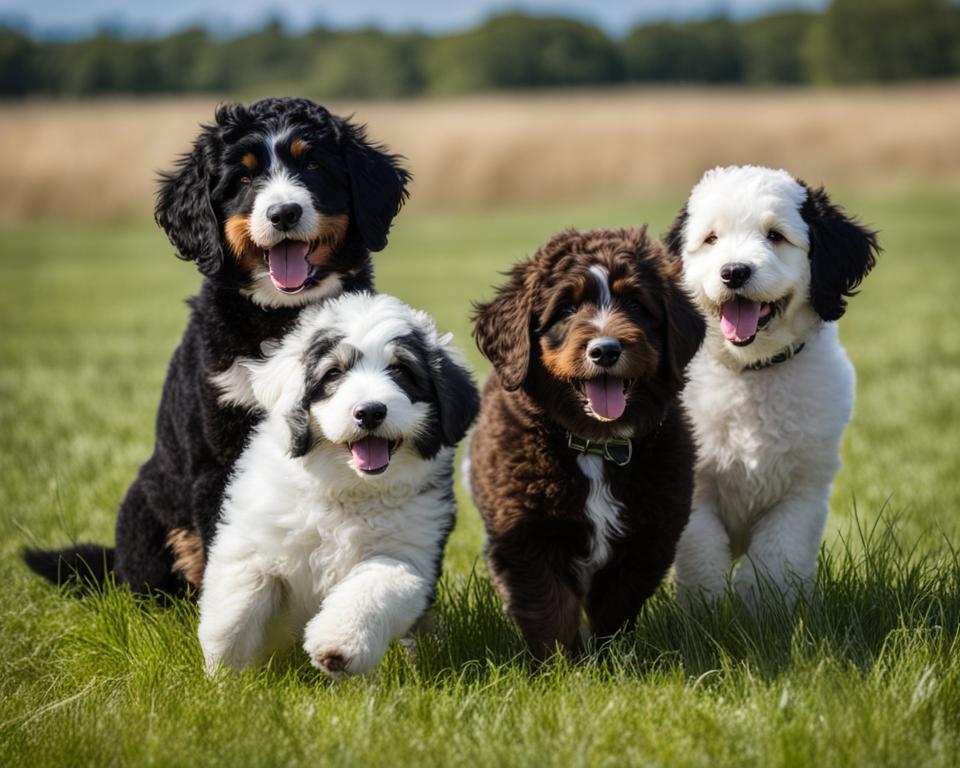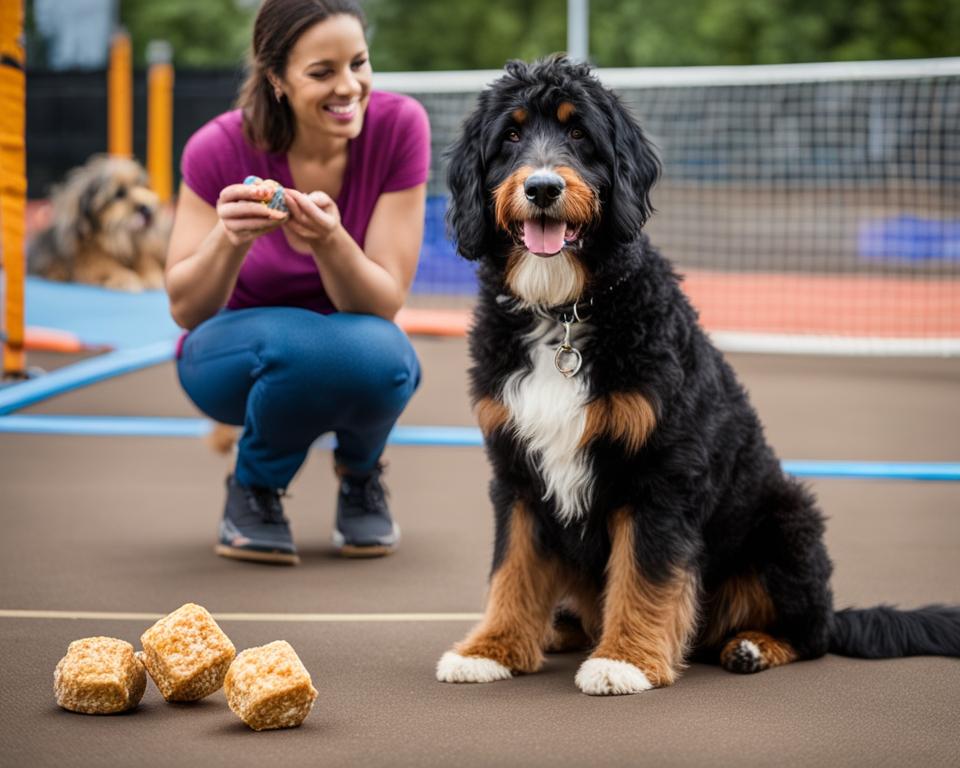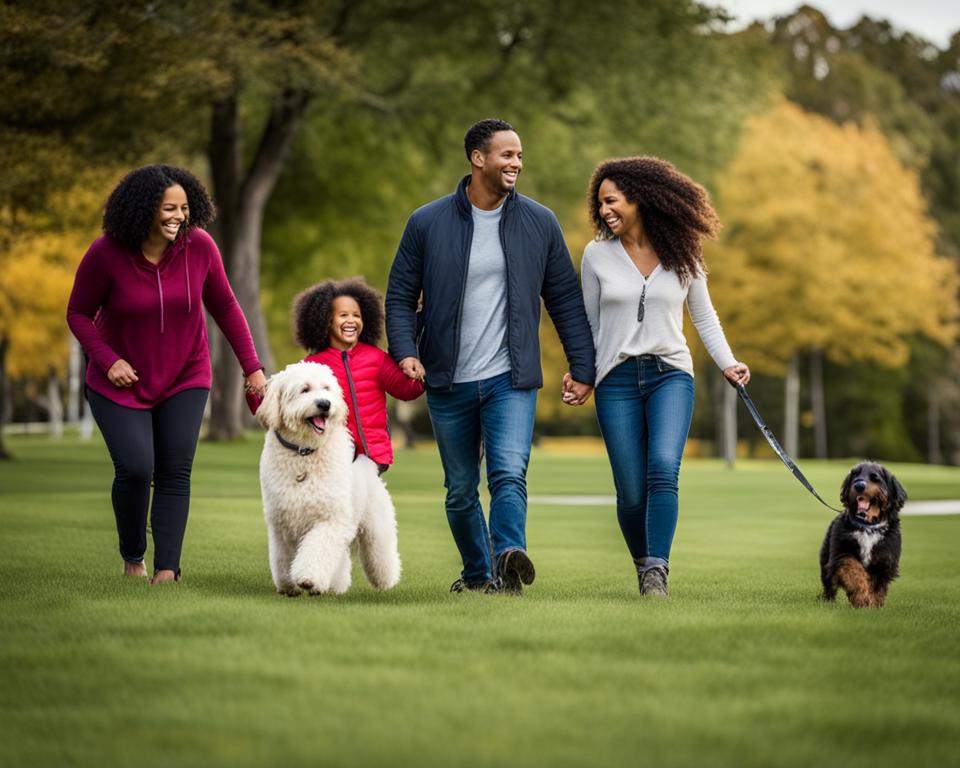If you are considering adopting a Bernedoodle, it’s important to understand the adoption process and requirements. Bernedoodles are a popular mixed breed designer dog that combines the traits of a Bernese Mountain Dog and a Standard Poodle. With their unique characteristics and lovable nature, Bernedoodles make wonderful companions. In this comprehensive guide, we will provide you with all the information you need to know about adopting a Bernedoodle.
Key Takeaways:
- Adopting a Bernedoodle requires understanding the adoption process and requirements.
- Bernedoodles are a mixed breed designer dog, combining the traits of a Bernese Mountain Dog and a Standard Poodle.
- They make lovable companions and have unique characteristics.
- This guide will provide you with all the necessary information for a successful Bernedoodle adoption.
- Make sure to familiarize yourself with the adoption process and requirements before bringing a Bernedoodle into your home.
A Brief Background on Bernedoodles
The Bernedoodle is a relatively new designer dog breed that originated in the early 2000s. The first breeder to purposely cross-breed the Standard Poodle and Bernese Mountain Dog was Sherry Rupke of Swissridge Kennels. While the Bernedoodle is not yet recognized as a purebred by the American Kennel Club, it has gained popularity, leading to more breeders producing these mixed pups. In addition to reputable breeders, Bernedoodles can also be found in shelters and rescue groups that focus on Poodles and Bernese Mountain Dogs.
Reputable Breeders
When looking to adopt a Bernedoodle, it is important to find a reputable breeder. Reputable breeders prioritize the health and well-being of their dogs and provide proper care, socialization, and genetic testing. They also offer transparency and are open to answering any questions or concerns potential adopters may have. To find reputable breeders, it is recommended to research and seek recommendations from trusted sources, such as breed clubs or veterinarians.
Shelters and Rescue Groups
For those who prefer to adopt rather than buy from a breeder, shelters and rescue groups can be a great option. Many shelters and rescue groups specialize in Poodles and Bernese Mountain Dogs, making it possible to find Bernedoodles in need of a loving home. Adopting from a shelter or rescue group not only provides a home for a dog in need but also supports the mission of rescue organizations to find forever homes for animals.
| Advantages of Reputable Breeders | Advantages of Shelters and Rescue Groups |
|---|---|
|
|
Whether adopting from a reputable breeder or a shelter, it is important to research and gather as much information as possible about the breeder or rescue organization. This ensures a positive adoption experience and gives the new owner confidence in their decision to bring a Bernedoodle into their home.
Bernedoodle Breed Characteristics
Bernedoodles are a popular mixed breed designer dog that come in a variety of sizes and coat colors. Understanding the different characteristics of Bernedoodles can help you choose the right one for your lifestyle and preferences.
Size is one of the distinguishing factors among Bernedoodles. They can range from tiny to standard, with weights ranging from ten pounds to ninety pounds. The various sizes allow for options that fit different living situations and activity levels.
The coat colors of Bernedoodles are another unique aspect of the breed. You can find Bernedoodles in completely black, black and white, black and brown, or tri-colored coats with patches of black, white, or brown. The wide range of coat options allows for individual preferences and style.
| Bernedoodle Sizes | Bernedoodle Coat Colors |
|---|---|
| Tiny | Completely black |
| Miniature | Black and white |
| Medium | Black and brown |
| Standard | Tri-colored |
In addition to size and coat color, Bernedoodles can also have different coat types. Some Bernedoodles have curly or wavy coats that are hypoallergenic, while others have straighter coats that may shed more. The coat type is an important consideration for those with allergies or preferences for low-shedding dogs.
Understanding the breed characteristics of Bernedoodles can help you make an informed decision when adopting one. Whether you prefer a tiny black Bernedoodle or a tri-colored standard Bernedoodle, there is a variety of options to choose from that suit your personal preferences and lifestyle.

Bernedoodle Personalities and Ideal Living Environment
Bernedoodles are beloved for their delightful personalities and make wonderful companions for individuals and families alike. Their temperament is a harmonious blend of the best qualities from both the Bernese Mountain Dog and the Standard Poodle.
These intelligent and loyal dogs are known for their friendly and affectionate nature. They are quick learners and respond well to positive reinforcement training techniques. Bernedoodles thrive in an environment where they receive plenty of mental stimulation and physical exercise.
When it comes to exercise, Bernedoodles have moderate to high energy levels, depending on their size. They require daily exercise to keep them happy and healthy. A leisurely walk or play session in the yard is essential, but they also benefit from more vigorous activities like hiking or swimming. It’s important to provide them with outlets to burn off their energy and prevent behavioral issues.
Bernedoodle Exercise Needs
| Size | Exercise Needs |
|---|---|
| Tiny and Mini Bernedoodles | Short, daily walks and play sessions |
| Medium and Standard Bernedoodles | Longer walks, playtime, and ample space to run |
When it comes to living environments, Bernedoodles can adapt well to different settings. While they appreciate a spacious yard to play in, they can also thrive in urban areas as long as their exercise needs are met. However, it’s essential to ensure they have enough space to move around comfortably.
It’s worth noting that Bernedoodles are social dogs and crave human companionship. They are not well-suited to being left alone for long periods and may develop separation anxiety if their social needs are not met. If you lead a busy lifestyle, it’s important to make arrangements for someone to spend time with your Bernedoodle or consider doggie daycare options.
Overall, Bernedoodles bring joy and love into the lives of their owners. With the right environment and care, these lovable pets will thrive and become cherished members of your family.
Caring for Your Bernedoodle Puppy
When you bring home a Bernedoodle puppy, it’s important to provide them with the care they need to thrive. This includes taking care of their dental health, grooming them regularly, and being aware of potential health conditions that can affect Bernedoodles.
Dental Care
Proper dental care is essential for your Bernedoodle’s overall health. Start by introducing your puppy to toothbrushing at a young age to get them used to the process. Use a soft-bristled toothbrush and dog-friendly toothpaste to gently brush their teeth at least two to three times a week. This helps prevent plaque buildup, tooth decay, and gum disease.
Grooming
Bernedoodles have a beautiful coat that requires regular grooming to keep it looking its best. Depending on the type of coat your Bernedoodle has, you may need to brush them several times a week to prevent matting and remove loose hair. It’s also recommended to take your Bernedoodle to a professional groomer every few months for a trim and to ensure their coat is properly maintained.
Health Conditions
While Bernedoodles are generally healthy dogs, there are some health conditions that they may be prone to. These can include joint dysplasia, which is a common issue in larger dog breeds, as well as certain blood disorders, cancers, and progressive retinal atrophy (PRA). Regular visits to the vet and keeping up with vaccinations are important for monitoring your Bernedoodle’s health and catching any potential issues early.
| Common Health Conditions in Bernedoodles | Description |
|---|---|
| Joint Dysplasia | A condition where the bones don’t fit together properly at the joints, leading to pain and mobility issues. |
| Blood Disorders | Bernedoodles can be prone to certain blood disorders, such as von Willebrand disease, which affects the blood’s ability to clot. |
| Cancers | Just like any other dog breed, Bernedoodles can develop various types of cancer. Regular check-ups and early detection are crucial for treatment. |
| Progressive Retinal Atrophy (PRA) | A degenerative eye disease that can lead to vision loss and blindness over time. Regular eye exams can help detect PRA early. |
Training a Well-Behaved Bernedoodle

To raise a well-behaved Bernedoodle, proper training and socialization are essential. Bernedoodles are intelligent and trainable but can sometimes exhibit a stubborn streak. Establishing a daily training schedule and routines from an early age is key to building a strong foundation for obedience.
One effective training method for Bernedoodles is using play as a reward. Incorporating fun and interactive games during training sessions can keep them engaged and motivated. It’s important to provide variation in training routines to avoid monotony and encourage continued learning.
Socialization is also a crucial aspect of training a Bernedoodle. Exposing them to different people, children, and other pets from a young age helps them develop friendly and confident behaviors. Consider enrolling your Bernedoodle in training classes or utilizing online resources for structured training programs that cover obedience training and socialization.
By investing time and effort into training and socializing your Bernedoodle, you’ll ensure they grow up to be well-behaved and happy companions.
Preparing for Your Bernedoodle Puppy’s Arrival
Getting ready for the arrival of your Bernedoodle puppy is an exciting time. To ensure a smooth transition, there are a few essential steps you should take and items you should gather beforehand.
Bernedoodle Puppy Checklist: Start by creating a checklist of everything you’ll need. This includes pet insurance to protect your puppy’s health and provide peace of mind. Schedule socialization classes to help your puppy become accustomed to different environments and behave well around others. Make a vet appointment to ensure your puppy receives the necessary vaccinations and care.
Potty Training: Potty training is an important aspect of puppy care. Set up a designated potty area and gather the necessary supplies, such as potty pads or outdoor training accessories.
Grooming Supplies and Puppy Essentials: Bernedoodles have unique grooming needs. Prepare by obtaining the appropriate grooming supplies, such as brushes, combs, and shampoos. Additionally, gather puppy essentials such as food, treats, bowls, collars, leashes, ID tags, and toys. Having these items ready will help your puppy settle into their new home comfortably.
FAQ
What is a Bernedoodle?
A Bernedoodle is a mixed breed designer dog that combines the traits of a Bernese Mountain Dog and a Standard Poodle.
What is the adoption process for a Bernedoodle?
The adoption process for a Bernedoodle may vary depending on the breeder or rescue organization, but typically involves filling out an application, a screening process, home visits, and an adoption fee.
What are the requirements for adopting a Bernedoodle?
The requirements for adopting a Bernedoodle may include providing a suitable living environment, having the financial means to care for the dog, and meeting any specific requirements set by the breeder or rescue organization.
Where is the best place to adopt a Bernedoodle?
The best place to adopt a Bernedoodle can be from a reputable breeder or a rescue organization that specializes in Bernedoodles or related breeds like Poodles and Bernese Mountain Dogs.
How much does it cost to adopt a Bernedoodle?
The adoption cost of a Bernedoodle can vary based on factors such as the breeder or rescue organization, the dog’s age, size, and health, but it can range from several hundred to several thousand dollars.
Are there any Bernedoodle rescue organizations?
Yes, there are rescue organizations dedicated to Bernedoodles and related breeds. These organizations rescue and rehome Bernedoodles in need of a loving home.
What should be on my Bernedoodle adoption checklist?
Your Bernedoodle adoption checklist should include items such as obtaining pet insurance, scheduling socialization classes, making a vet appointment, purchasing essential supplies, and setting up a puppy station.
How do I prepare for my Bernedoodle puppy’s arrival?
To prepare for your Bernedoodle puppy’s arrival, you should have a checklist of supplies ready, set up a safe and comfortable space for the puppy, schedule necessary appointments, and research training and care techniques.
What are the grooming needs of a Bernedoodle?
The grooming needs of a Bernedoodle can vary based on the type of coat they have. Some Bernedoodles have hypoallergenic, curly or wavy coats that require regular brushing and professional grooming, while others have straighter coats that may shed more.
Are Bernedoodles good with children and other pets?
Bernedoodles are typically known for their good demeanor and friendly temperament. With proper socialization from an early age, they can be good with children and get along well with other pets.

Leave a Reply